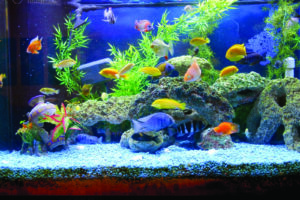By Dr. Beth Leermakers
When I win the lottery, I’m going to have tropical fish and an aquarium service. Many people share my fascination with the colorful, captivating creatures. Fish are the third most popular pet, following dogs and cats. According to the 2021-2022 APPA National Pet Owners Survey, 90.5 million American households (70 percent) own a pet, with 14.7 million owning fish. Sixty-nine million and 45.3 million households have dogs and cats, respectively. Freshwater fish account for the largest number of pets owned in the United States. There are over 139.3 million freshwater fish, versus 94.2 million cats and 89.7 million dogs.

Photos courtesy of Fishtanksdirect.com
Fish are appealing for many reasons. In addition to being quiet and relatively low maintenance (no walks required!), pet fish have several physical and mental health benefits. Keeping fish or just watching them:
Reduces stress and anxiety. Watching fish is soothing and hypnotic. One study found that dental patients who looked at an aquarium for 40 minutes before elective dental surgery had lower anxiety and reported feeling more comfortable during the surgery. No wonder so many doctors, dentists and therapists have aquariums in their waiting rooms. Watching fish in aquariums may stimulate the production of serotonin, leading to higher levels of endorphins. Released in response to pain or stress, endorphins (the body’s natural painkillers) relieve pain and create a sense of wellbeing. Lower stress and anxiety may translate to better sleep.
Lowers blood pressure and heart rate. One study examined people’s behavioral, physiological and psychological reactions to marine life in a large aquarium exhibit during three stages of restocking: unstocked, partially stocked and fully stocked. Watching marine life at the National Marine Aquarium for just five minutes led to a seven percent reduction in heart rate and a four percent decrease in blood pressure. Even looking at the unstocked tank (without fish, but decorated with rocks and seaweed) lowered people’s heart rates by three percent. The more fish in the tanks, the greater the response. People spent more time watching the exhibit and reported a more positive mood when there were more fish in the tanks.
Increases eating and decreases disruptive behaviors in Alzheimer’s patients. Purdue University researchers found that Alzheimer’s patients who were exposed to tanks with brightly colored fish were more relaxed and alert and ate 17 percent more food than they did before the introduction of the fish. The study also found a decrease in the number of instances and duration of behaviors such as wandering, pacing, yelling and physical aggression. The fish held the patients’ attention for up to 30 minutes — a relatively long time for Alzheimer’s patients.
Tips for Successful Fishkeeping
Bringing fish into your home isn’t as easy as dumping a goldfish into a big bowl. Establishing a safe aquatic environment requires preparation and patience (getting the water right takes time). Maintenance requires changing some of the water regularly, cleaning the gravel bed and providing the proper filtration. You may need to take your fish to the vet, so you’ll need to find a vet who has experience with pet fish.
Here are a few tips:
Buy the biggest aquarium you can afford (24” or larger). Bigger is better, since larger bodies of water are more stable. Rectangular tanks provide the surface area and swimming length that fish prefer.
You’ll also need gravel (coated or pre-washed), decorations designed for aquariums (e.g., live or artificial plants and ornaments), water conditioner (to dechlorinate tap water, making it safe), a net (for transferring fish), gravel washer (for water changes and cleaning) and food. If you’re planning to keep tropical fish, you’ll also need a heater.
Start with easy fish. These 12 fish are striking, good natured and easy to care for, making them suitable for beginners. Freshwater: goldfish, guppies, zebra danios, bushynose plecos, neon tetras and mollies. Saltwater: clownfish, lawnmower blenny, butterfly fish, chalk bass, watchman goby and pajama cardinalfish.
Location, location, location. Place your aquarium on a flat, level surface that can support its total weight (approximately 10-12 lbs. per gallon of water). Put your tank near an electrical outlet. Do NOT place your aquarium near a heat source or air conditioner, or in direct sunlight. Full or even partial sunlight can cause excessive algae growth.
Set up optimal water conditions. You’ll need to condition the water using a dechlorinating agent along with a biological aquarium supplement. You’ll need to check the pH level of the water (using a pH test kit) regularly and maintain the proper level. Stabilizing the water temperature is also crucial. As mentioned above, avoid placing your tank near a window or heating or air vents. Tropical freshwater fish need a constant water temperature of 72 degrees to 82 degrees F. An aquatic heater will help you maintain the correct temperature.
Don’t overstock. Resist the temptation to put a lot of fish in your new tank. Add only a few recommended fish at first, gradually introducing more during the next four to six weeks. Fewer, healthier fish are better than lots of stressed-out fish. If you put too many fish into your aquarium too soon, they may die. The best way to combat this “new tank syndrome” is to cycle your tank properly by getting a colony of bacteria growing in your filter before you add fish, so they are ready to consume the waste as soon as the fish are added. To do this, you’ll add maturation agents to the water that add live bacteria. If you add too many fish too soon, the bacteria will not multiply in time and ammonia and nitrite will be present in the water, poisoning the fish.
Do your research before you bring fish home (straight from the store, without making stops along the way). After you get the hang of fishkeeping, you’ll be able to sit back, relax and enjoy the show.
